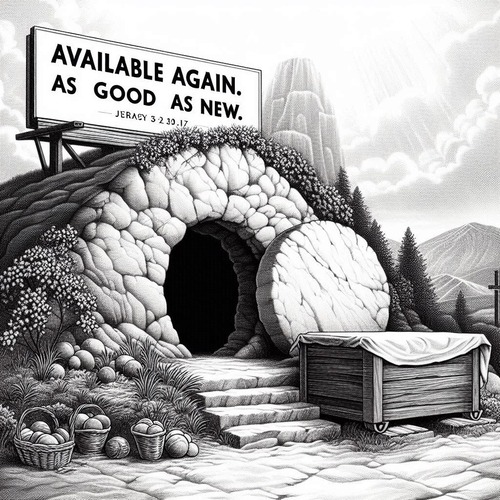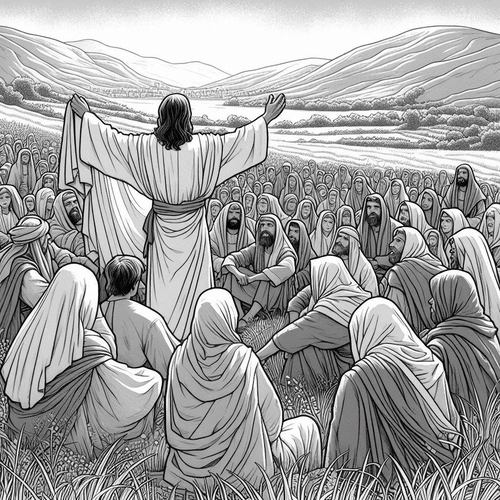Sin’s Eternal Penalty: Why Isn’t Jesus Our Substitute Still Paying?
SHOULDN’T AN ETERNAL PENALTY REQUIRE ETERNAL PAYMENT?
It’s a question that cuts to the heart of Christian theology: If the penalty for sin is eternal punishment in hell, and Jesus took our place as our substitute, why isn’t He still suffering?
This challenging objection deserves careful examination. Far from undermining the gospel, a proper understanding of Scripture reveals why Christ’s finished work was both complete and sufficient—despite the eternal nature of hell’s punishment.
THE NATURE OF ETERNAL PUNISHMENT VS CHRIST’S TEMPORAL SUFFERING
The objection assumes sin’s eternal penalty requires eternally ongoing payment from our substitute. But this misunderstands both the nature of justice and the unique capacity of Christ as our representative.
Hell’s punishment is indeed unending and unrelenting—Luke 16:24 shows the rich man in agony with no respite, crying out for even a drop of water. The damned experience continuous conscious punishment because their finite persons cannot satisfy infinite justice. They remain forever in debt, forever paying—yet never able to pay in full.
Christ’s situation was fundamentally different. As the God-man, He possessed both the human nature necessary to represent us and the divine nature necessary to bear infinite wrath completely. Isaiah 53:10-11 tells us that “when his soul makes an offering for sin, he shall see his offspring.” His infinite divine worth meant His suffering, though temporal, was sufficient to exhaust God’s wrath against sin.
The key distinction is this: finite beings in hell pay forever because they cannot pay enough, while Christ paid completely in finite time because His infinite person could absorb the full penalty. It’s not that the penalty was smaller for Christ—it’s that His capacity to bear it was greater—infinitely greater.
THE FINISHED WORK: “TETELESTAI”
When Jesus cried “It is finished” (John 19:30), He used the Greek word tetelestai—a term meaning “paid in full.” This wasn’t a progress report; it was a declaration of completion. The atonement wasn’t an ongoing process requiring eternal continuity—it was a finished work.
Hebrews 9:12 confirms this: Christ “entered once for all into the holy places, not by means of the blood of goats and calves but by means of his own blood, thus securing an eternal redemption.” Notice the past tense—He secured eternal redemption through a completed act.
The resurrection serves as God’s divine vindication of Christ’s completed work. Romans 4:25 tells us Jesus “was delivered up for our trespasses and raised for our justification.” If the Father hadn’t been fully satisfied with the Son’s sacrifice, there would have been no resurrection. Christ’s rising from the dead is God’s “receipt” showing the payment—for sin’s eternal penalty—was accepted in full.
THE INFINITE VALUE OF CHRIST’S PERSON
The value of an act is determined by the dignity of the person performing it. When the eternal Son of God—the second person of the Trinity—suffered and died, that suffering possessed infinite value because of His infinite person.
Acts 20:28 speaks of “the church of God, which he obtained with his own blood.” This isn’t merely human blood—it’s the blood of God incarnate. Peter echoes this in 1 Peter 1:18-19, describing how, despite sin’s eternal penalty, we were ransomed “not with perishable things such as silver and gold, but with the precious blood of Christ.”
Furthermore, Christ didn’t suffer as a private individual but as our federal head and representative. Romans 5:12-21 presents the Adam-Christ parallel: just as Adam’s one act of disobedience brought condemnation to all he represented, Christ’s one act of obedience brought justification to all He represents. As 1 Corinthians 15:22 puts it: “For as in Adam all die, so also in Christ shall all be made alive.”
Christ’s representative capacity means His work was inherently sufficient for all His people. Despite sin’s eternal penalty, Jesus didn’t need to suffer individually for each person—He suffered as the Second Adam, bearing the sins of all who would believe.
DIFFERENT RECIPIENTS, DIFFERENT EXPERIENCES
Why then do unbelievers face eternal punishment while Christ’s suffering was temporal? The answer lies in the different capacities of finite and infinite persons.
Sinners in hell bear punishment in their finite, created persons. Because they cannot exhaust infinite punishment through their finite capacity, the punishment continues eternally. They can never “pay off” the debt because their finite nature cannot satisfy infinite justice quickly.
Christ, however, possessed both human and divine natures. Galatians 3:13 tells us He “became a curse for us,” and 2 Corinthians 5:21 says God “made him to be sin who knew no sin.” His infinite divine capacity enabled Him to bear the full weight of infinite wrath in finite time—something no mere creature could accomplish.
PUNISHMENT VS CONSEQUENCES: A CRITICAL DISTINCTION
Reformed theology distinguishes between active divine punishment and the natural consequences of sin. Christ bore God’s active wrath—the punishment component. Hell involves both God’s punishment and the natural consequence of eternal separation from the source of all life and goodness.
2 Thessalonians 1:9 describes the lost as suffering “the punishment of eternal destruction, away from the presence of the Lord.” This separation is itself part of the judgement, but it doesn’t require ongoing active punishment from God in the same way Christ experienced on the cross.
Romans 3:25-26 assures us that in Christ’s sacrifice, God is both “just and the justifier.” Divine justice was fully satisfied at Calvary—no further payment is needed or possible.
CONFIDENCE IN CHRIST’S COMPLETE WORK—DESPITE SIN’S ETERNAL PENALTY
The Bible’s answer to our opening question brings tremendous comfort: Jesus isn’t still paying because He already paid in full. His infinite person made His finite suffering sufficient for infinite sins. His cry of “It is finished” wasn’t premature—it was the triumphant declaration of completed redemption.
As Hebrews 7:25 promises, “he is able to save to the uttermost those who draw near to God through him, since he always lives to make intercession for them.” Christ’s work was so complete that He now intercedes for us from His position of victory, not from ongoing suffering.
The penalty for sin is indeed eternal—but Christ, in His infinite worth and perfect obedience, paid that penalty completely. We can rest confidently in His finished work, knowing our salvation rests not on ongoing payments but on a debt forever satisfied at Calvary’s cross.
SIN’S ETERNAL PENALTY: RELATED FAQs
What does the Westminster Confession say about Christ’s payment in full for sin’s eternal penalty? The Westminster Confession (8.5) teaches Christ “made a proper, real, and full satisfaction to his Father’s justice on their behalf.” It emphasises His obedience and satisfaction were “accepted of the Father” as complete payment. The Confession affirms Christ’s divine nature gave infinite value to His human suffering, making His temporal work eternally sufficient.
- How did the Reformed fathers address this question? John Calvin taught Christ’s divine person made His suffering infinitely valuable, writing in his Institutes (2.16.6) that “it was necessary for the Son of God to become man, that he might there make satisfaction.” He argued only the God-man could bear infinite wrath in finite time. Calvin emphasised Christ’s divine nature wasn’t separate from His suffering but made it infinitely efficacious.
- What about the Reformed doctrine of “limited atonement”—did Christ suffer enough for everyone? Reformed theology teaches Christ’s suffering was sufficient in value for all humanity, but efficient only for the elect. John Owen argued Christ’s work was “intrinsically sufficient” for the whole world due to His infinite person. The limitation isn’t in the value of Christ’s sacrifice but in God’s intention—He secured actual salvation for His chosen people, not merely made salvation possible.
How do we explain Christ’s cry “My God, why have you forsaken me?” Theologians like Charles Hodge and BB Warfield taught Christ’s cry represents the climax of His bearing God’s wrath, not the beginning of eternal separation. It demonstrates the intensity of divine wrath against sin that Christ absorbed in those hours. The cry shows Christ experienced hell’s essence (separation from the Father) without hell’s duration, satisfying justice completely.
- Does the doctrine of eternal punishment require that Christ suffer in hell itself? No, Reformed theology distinguishes between bearing hell’s penalty and experiencing hell’s location. Christ bore the essence of sin’s eternal penalty and of hell’s punishment—God’s wrath and separation—while remaining on the cross and in the tomb. As the Westminster Larger Catechism (Q.49) states, Christ’s humiliation included suffering “the wrath of God” and being “under the power of death,” not literal descent into hell’s place.
- How does Christ’s active obedience relate to this question? Christ not only paid sin’s penalty (passive obedience) but also earned righteousness through perfect obedience (active obedience). This double imputation means believers receive both forgiveness and positive righteousness. Christ’s active obedience throughout His life, not just His death, contributes to our complete salvation, making His finished work even more comprehensive than mere penalty-bearing.
What did Jonathan Edwards say about the infinite nature of sin and punishment? Edwards argued in The Justice of God in the Damnation of Sinners that sin against an infinite God deserves infinite punishment, which finite creatures can never fully pay. However, Christ as an infinite person could bear this infinite guilt completely. Edwards emphasised sin’s demerit is measured by the dignity of the being offended (God), making Christ’s infinite dignity the perfect solution to infinite guilt.
SIN’S ETERNAL PENALTY: OUR RELATED POSTS
Editor's Pick

The Throne-Room Vision: Who Did Isaiah See?
The scene is unforgettable: Isaiah stands in the temple, and suddenly the veil between heaven and earth tears open. He [...]

The Angel of the Lord: Can We Be Certain It Was Christ All Along?
Throughout the Old Testament, a mysterious figure appears: the Angel of the LORD. He speaks as God, bears God’s name, [...]
SUPPORT US:
Feel the Holy Spirit's gentle nudge to partner with us?
Donate Online:
Account Name: TRUTHS TO DIE FOR FOUNDATION
Account Number: 10243565459
Bank IFSC: IDFB0043391
Bank Name: IDFC FIRST BANK






